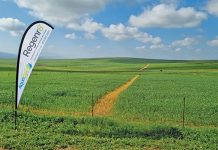For the third time, the Stirk family of Goodwoods Farm have won the
Mangold Trophy for ecofriendly farming. Alongside a mixed crop system
run in rotation, Justin Stirk now runs a successful Bonsmara stud and has found that donkeys effectively protect his smallstock from predators. Bob Ford reports.
the prestigious Mangold
Trophy for the best-conserved and utilised farm isn’t awarded lightly, but the Bathurst Conservation Committee has presented it for the third time to Justin and Karen Stirk of Goodwoods Farm in Southwell, near Grahamstown.
With a BCom degree from Rhodes University, Justin is a director of Chicory South Africa and serves on the Bathurst Show committee as chief steward of the cattle section. The 1 384ha farm has been in the Stirk family for four generations, since 1891. In the late 1970s and early 1980s, Justin’s father Dennis built four storage dams with a combined capacity of 150 000m3, originally to store water for pasture irrigation.
A range of crops
In 1995, Justin introduced drip irrigation on 30ha in 6ha blocks. Each is cultivated under rotation crops of cabbage, maize and cherry bell peppers, for four years, followed by a Rhodes grass ley crop for five years. The cabbages are sold off the farm to informal traders. Carara Agro Processing in Grahamstown processes the peppers for export to Europe, while the maize is used on the farm.
Recently Justin had to deal with bush encroachment and used the herbicide Bundu to restore 30ha for crop land, applying it on the stems of bushes with an applicator gun. Angora goats also help keep regrowth in check.
Justin’s latest venture is macadamias. He started planting a 7ha orchard in 2003, in consultation with a neighbouring farmer and Len Hobson, one of the South Africa’s macadamia pioneers. He’s using the cultivar Beaumont, which bears fruit well and can withstand wind. The trees are under drip irrigation and the first real crop is expected in 2010 when they’re seven years old.
Prof Colleen Heyburn from Rhodes University is working on a biological pest-control programme for macadamias using viruses. If successful it will have far-reaching benefits for the industry. Besides their food value, macadamias are a source of over 200 products such as oils and pharmaceuticals.
Justin also grows from 20ha to 40ha of chicory under rain-fed cultivation to rejuvenate ailing pastures, which also benefit from residual fertiliser.
This labour-intensive crop creates jobs.
A passion for Bonsmaras
But Justin’s passion is his Bonsmara cattle. He started recording in 1992, using the Stud Master programme, and converted the herd to a stud in 2003.
“We were already recording data such as weight,” recalls Justin. “I asked myself if I would make more money with a stud herd or a commercial herd. I’m happy with the results and, more importantly, I enjoy what I’m doing.”
It didn’t take him long to make his mark in the industry and he sold his first two bulls at the annual Eastern Cape Bonsmara Club sale in 2004. Six like-minded breeders started an annual Frontier Sale in Grahamstown, selling bulls from a heartwater, redwater and gallsickness area at a central venue. At last year’s sale Justin sold 14 bulls with a highest price of R40 500 for a commercial bull. The other 45 bulls sold for an average price of R31 033. Altogether 42 bulls and 90 commercial females were on offer at the sale this year, including 13 bulls Justin offered.
A herd of 160 stud females have a large enough gene pool for Justin to strictly select his breeding stock. He uses sires from Fourie Scheepers of Fouriesburg, Glyn Handley of Bathurst, Norton Thompson of Komga, Wally Stray of Elliot and JJ Park of Bedford. Semen from some of the country’s top bulls EI 94 339, CEF 02 328 and NPT 91 020 are used in his AI programme.
In addition to his stud herd, Justin runs 100 commercial cows on leased land near the coast, as well as 450 Dorper ewes for fat lamb production. After losing 150 sheep in two months in 2006, Justin protects his sheep from black-backed jackal with donkeys. “The donkey must be a jenny and must develop a bond with the sheep,” advises Justin. “Donkeys have been known to kill jackal.”
More awards to come?
In future Justin plans to increase his livestock numbers and grow high-value crops on smaller areas. His approach is clearly successful. In 2006/07 he received the trophy for the highest dryland chicory yield (28,7t/ha) and last year he won the award for the highest yield (22t/ha) and the lowest discard rate for cherry bell peppers.
Contact Justin Stirk on (046) 622 2102 or 082 662 5901. |fw








